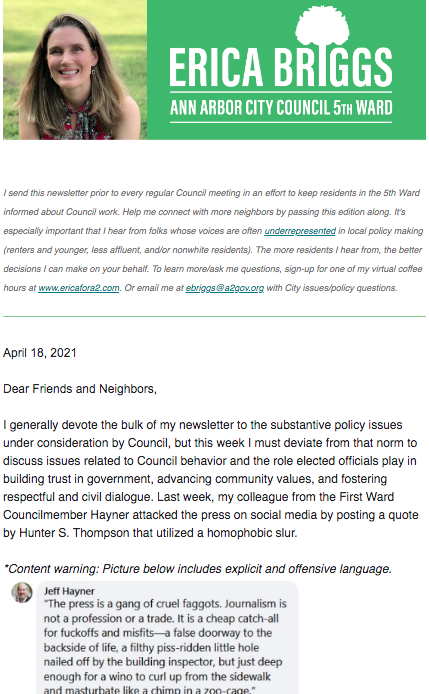Council Votes to Remove Member From His Boards and Commissions for Seven Months, “Against Advice of Counsel”
by Patricia Lesko
On April 19, 2021, in a move that the Ann Arbor City Attorney Stephen Postema called “unprecedented,” Jeff Hayner (D-Ward 1) was stripped of his seats on seven boards and commissions, including the Parks Advisory Commission, the Greenbelt Advisory Commission, the Liquor Board and the Center of the City group. The punishment was meted out in response to Hayner’s social media post of a 50-year-old literary quotation by Hunter S. Thompson in which Thompson’s character Raoul Duke attacks the media, and uses the slur “faggot.” Despite the fact that Council member Hayner had violated no Council Ethics Rule and no state or federal law, eight members of Council voted to punish him. Former Ward 1 Council member Ron Suarez posted a comment on Twitter that called the vote a civil rights violation impacting 25,000 Ward 1 residents. “Taxation Without Representation.” Tweeted Suarez.
Over the course of a 90-minute debate, City Attorney Postema repeatedly recommended to Council members that the agenda item be postponed for two weeks to allow him to prepare a written memo addressing the legality of what Ali Ramlawi (D-Ward 5) called a “rush to judgement.” Despite supporting postponement, and speaking strongly against the resolution, Council member Elizabeth Nelson (D-Ward 4), a lawyer, went on to vote in support of the resolution. She has since claimed she was “bullied” into voting for the resolution, and was “sobbing” during the Council meeting. Critics on social media accused the Ward 4 Council member of “wasting everyone’s time,” and of caring more about her re-election in 2022 than about due process.
The resolution to remove Hayner was never presented in writing to the Council’s Administration Committee or to Hayner prior to the April 19 Council meeting. As a result, Council members submitted a flurry of procedural and legal questions to the City Attorney. He answered their questions in rapid fire, staccato, stumbling and stuttering (video).
The Attorney cited sections of the City Charter so quickly that Council member Ramlawi admitted later that he’d had “no idea” what Postema had said. During his presentation, Postema told Council that it had the authority to strip Hayner of his board and commission appointments. Yet, despite repeatedly assuring Council it had the legal authority to punish Hayner, the City Attorney recommended that Council postpone the vote to allow him to do necessary legal research, and to release his legal opinion to the public.
“Obviously we did not have something in writing,” said Postema. “Basically, there have been a lot of concerns. As far as the power to effectuate removal, the Council ultimately has the ability to do that. Having said all that, I am still looking at it from a process standpoint. I would like to get a memo out on all of this. I’m still looking into some issues. I therefore recommend that you postpone this for two weeks. My recommendation is for you to wait until you get the full memo.”
Postema repeated this request for a two-week postponement three times during Council’s 90-minute discussion of the resolution. Council member Elizabeth Nelson’s motion to postpone the resolution for two weeks was voted down.
Council members Griswold (D-Ward 2) and Ramlawi, both of whom are members of the Administration Committee, were sharply critical of the lack of “due process” during the meeting at which Hayner was accused. Ramlawi pointed out that Julie Grand (D-Ward 3) had lodged her complaint 10 minutes into the meeting of the Administration Committee as “new business.” Council member Griswold described Grand as “happy, elated” as the Administration Committee meeting began. Both Griswold and Ramlawi also pointed out that Travis Radina (D-Ward 3) could have chosen a more collegial path in dealing with his complaint. One Ward 5 resident, a gay man, in a letter to Council criticized Radina and others for using the LGBTQ community for political games. During the heated discussion, Radina complained that his motivations had been questioned by a number of people.
Radina also claimed during the discussion that he had received “threatening letters” to his home. There is no AAPD record of any complaint filed by Radina.
After the meeting, one Council member said, “Travis is entitled to his experiences, but this isn’t about how he grew up or what he experienced. It’s about a dysfunctional public body, a mayor who can’t lead and political games. Taylor wants a super-majority, and he doesn’t care who he steps on or uses to get it.”
At the Council meeting, Hayner said that he had tried to call both Radina and the Mayor and neither had returned his calls. Neither Taylor or Radina explained why they had not responded to Hayner’s calls. Radina, during the meeting, complained angrily that he was “exhausted” by the discussion of whether to strip Hayner of his board and committee appointments.
Council member Lisa Disch (D-Ward 1), a faculty member at the University of Michigan, said about Hayner’s use of a literary quote published five decades ago, “This is an act of speech.” Disch went on to say it matters when an elected official says something inappropriate. Disch, at one of her first Planning Commission meetings, was caught out in the press telling city staff that they ought to “be sneaky” and withhold information about planned developments from the public in order to “avoid controversy.” Disch apologized for suggesting staff violate Michigan law, and Council took no action against her.
There have been numerous questions from the public concerning an alleged double standard being applied to Hayner versus Council members who have broken Council Rules, state and federal laws, including Taylor himself.
In 2009, then Council member Christopher Taylor was involved in an email scandal in which members of Council were caught deliberating in secret, making fun of residents and rigging votes. Their actions triggered an Open Meetings Act lawsuit against the City which the City Attorney was forced to settle. Taylor never apologized. Then Council member Margie Teall (D-Ward 4) initially refused to apologize for her part in vote-rigging and deliberating in secret. Likewise, Leigh Greden, then representing Ward 3, was revealed by emails obtained by the media to have been the ringleader of the OMA scandal. Like Teall, Greden initially refused to apologize. Council took no action against any of the seven members whose actions triggered a lawsuit and settlement. Greden worked on and donated several hundred dollars to Radina’s campaign.
In 2019, former Council member Ackerman (D-Ward 3) was arrested for felony super drunk driving, and sentenced. Body cam footage showed Ackerman lied to the arresting officer, but was not charged for doing so. Ackerman hid the crime and his sentencing from his constituents for months. He apologized two weeks after his crime came to light, and Council took no action against him. Julie Grand, who had lodged the complaint against Hayner for breaking no Council Rules, state of federal laws, reportedly said about Ackerman’s crime that she would never vote to remove him from any board or commission. A conviction for public drunkenness is one of the six legal reasons Michigan’s governor may be petitioned by a member of the public to remove a local elected official.
In March 2021, Council member Jen Eyer Irwin (D-Ward 4) was accused by six women of enabling their serial sexual harassment at the hands of Eyer Irwin’s business partner at Vanguard Public Relations, and friend, TJ Bucholtz. Eyer Irwin has repeatedly claimed all of the women are lying. Central Michigan University launched an investigation into connections between staff and faculty at the college who may have also enabled the serial predation at Vanguard by sending CMU female students to work there. So far, two CMU staff members have been fired.
On March 31, 2021 MLive published a piece in which it was revealed that Eyer Irwin had repeatedly lied to voters while campaigning for office. Council has taken no action against Eyer Irwin.
Council member Erica Briggs (D-Ward 5) read from a prepared statement on April 19. “I am prepared to vote on this this evening,” said Briggs, even after the City Attorney had requested postponement. In her newsletter, distributed to several thousand residents the day before the meeting, Briggs reprinted in its entirety the Hunter S. Thompson quote and criticized Hayner’s apology as “lackluster.” Briggs did not redact the word faggot, even after a week of communications from community members, including Radina, stating how upsetting the word is to them. At the meeting, Briggs went on to claim that voting in favor of the resolution “gives me no joy.” In her written statement read at Council, Briggs pointed out that Hayner’s post had been critical of the media.

Thirteen days earlier, Mayor Taylor and Council member Grand both took to social media to attack both MLive and the City Administrator over the legal release of a public record requested by MLive but withheld from the outlet without their knowledge by the City Attorney, an alleged violation of the Michigan Freedom of Information Act. Briggs said nothing about the attacks aimed at MLive and the City Administrator by Grand and Taylor.
The Attorney’s withholding of public police reports requested by MLive and a resident, covered up a domestic violence crime committed by Council member Jen Eyer’s husband, a crime for which he was sentenced on March 23.
On April 6, Hayner sent an email to the City Administrator and City Attorney in which he asked for an investigation into the alleged corruption surrounding the City Attorney’s withholding of the public record from MLive to the benefit of the Council member, her husband and her husband’s son, State Senator Jeff M. Irwin, who was present during the domestic violence incident.
Thirteen days later, with his call for an investigation of the City Attorney unanswered, Hayner found himself under attack. He watched as the City Attorney whom he’d demanded be investigated for alleged corrupt practices, told Council that stripping Hayner of his board and commission appointments was “supported by the City Charter.”
Ann Arbor’s City Charter doesn’t automatically confer legality. In 2014, Postema told Council members (including Taylor) of the legality of a City Charter section that required residents who wanted to run for City Council to reside in their respective wards for no less than a year prior to the primary election date. Dascola vs. The City of Ann Arbor was decided by federal Judge Avern Cohn. In his opinion, Cohn lambasted Postema for defending the unconstitutional Charter requirement. The judge, in his opinion, accused the Ann Arbor City Attorney of attempting to subvert the United States Constitution. The suit cost the city $37,000 and the unconstitutional section of the Charter was struck.
Council members Disch, Song (D-Ward 2), Grand and Briggs all said that the severity of Hayner’s transgression in using the offending literary quote was such that immediate action needed to be taken. In response, Ramlawi pointed out that the new members of Council had promised less vindictiveness and toxicity while running for Council. “But in the past six months,” said Ramlawi, “I have seen more vindictiveness and more toxicity. I have heard from people I respect that we are a joke. That this Council is a joke.”
Council member Disch wrote in an email posted to social media the day after the meeting that she had received “threats,” but despite those threats and “against the advice of Counsel [I voted] to remove Hayner from his Board and Committee appointments until December 1 [2021].”
The Mayor, Lisa Disch, Lihn Song, Travis Radina, Julie Grand, Elizabeth Nelson, Jen Eyer Irwin and Erica Briggs ignored the City Attorney and voted in favor of the resolution. Hayner asked the body to recuse him and his request was granted. Council members Griswold and Ramlawi voted against the resolution.

